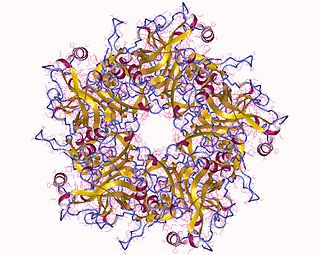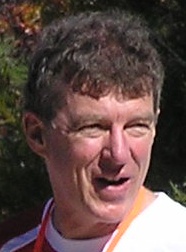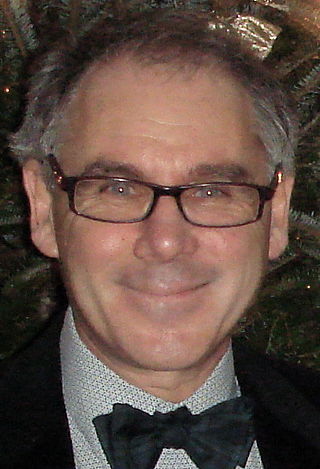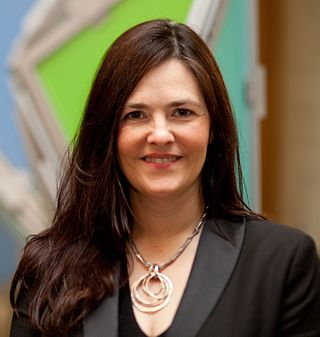Related Research Articles

Cervical cancer is a cancer arising from the cervix or in the any layer of the wall of the cervix. It is due to the abnormal growth of cells that have the ability to invade or spread to other parts of the body. Early on, typically no symptoms are seen. Later symptoms may include abnormal vaginal bleeding, pelvic pain or pain during sexual intercourse. While bleeding after sex may not be serious, it may also indicate the presence of cervical cancer.

Human papillomavirus infection is caused by a DNA virus from the Papillomaviridae family. Many HPV infections cause no symptoms and 90% resolve spontaneously within two years. In some cases, an HPV infection persists and results in either warts or precancerous lesions. These lesions, depending on the site affected, increase the risk of cancer of the cervix, vulva, vagina, penis, anus, mouth, tonsils, or throat. Nearly all cervical cancer is due to HPV, and two strains – HPV16 and HPV18 – account for 70% of all cases. HPV16 is responsible for almost 90% of HPV-positive oropharyngeal cancers. Between 60% and 90% of the other cancers listed above are also linked to HPV. HPV6 and HPV11 are common causes of genital warts and laryngeal papillomatosis.

Anal cancer is a cancer which arises from the anus, the distal opening of the gastrointestinal tract. Symptoms may include bleeding from the anus or a lump near the anus. Other symptoms may include pain, itchiness, or discharge from the anus. A change in bowel movements may also occur.

Human papillomavirus (HPV) vaccines are vaccines that prevent infection by certain types of human papillomavirus (HPV). Available HPV vaccines protect against either two, four, or nine types of HPV. All HPV vaccines protect against at least HPV types 16 and 18, which cause the greatest risk of cervical cancer. It is estimated that HPV vaccines may prevent 70% of cervical cancer, 80% of anal cancer, 60% of vaginal cancer, 40% of vulvar cancer, and show more than 90% effectiveness in preventing HPV-positive oropharyngeal cancers. They additionally prevent some genital warts, with the quadrivalent and nonavalent vaccines that protect against HPV types HPV-6 and HPV-11 providing greater protection.

Ian Hector Frazer is a Scottish-born Australian immunologist, the founding CEO and Director of Research of the Translational Research Institute (Australia). Frazer and Jian Zhou developed and patented the basic technology behind the HPV vaccine against cervical cancer at the University of Queensland. Researchers at the National Cancer Institute, Georgetown University, and University of Rochester also contributed to the further development of the cervical cancer vaccine in parallel.

Gardasil is an HPV vaccine for use in the prevention of certain strains of human papillomavirus (HPV). It was developed by Merck & Co. High-risk human papilloma virus (hr-HPV) genital infection is the most common sexually transmitted infection among women. The HPV strains that Gardasil protects against are sexually transmitted, specifically HPV types 6, 11, 16 and 18. HPV types 16 and 18 cause an estimated 70% of cervical cancers, and are responsible for most HPV-induced anal, vulvar, vaginal, and penile cancer cases. HPV types 6 and 11 cause an estimated 90% of genital warts cases. HPV type 16 is responsible for almost 90% of HPV-positive oropharyngeal cancers, and the prevalence is higher in males than females. Though Gardasil does not treat existing infection, vaccination is still recommended for HPV-positive individuals, as it may protect against one or more different strains of the disease.
Cervarix is a vaccine against certain types of cancer-causing human papillomavirus (HPV).
Margaret Anne Stanley, OBE FMedSc, is a British virologist and epithelial biologist. She attended the Universities of London, Bristol, and Adelaide. As of 2018, she is an Emeritus Professor of Epithelial Biology in the Department of Pathology at the University of Cambridge and a Fellow of the Academy of Medical Sciences. She is also an Honorary Fellow of the UK Royal College of Obstetricians and Gynaecologists and an honorary fellow of Christ's College, Cambridge. Stanley is a research scientist in virology focusing on the human papillomavirus (HPV). Her research work has led to new scientific findings on HPV. Additionally, she uses her expertise on HPV to serve on multiple advisory committees and journal editorial boards.

Professor Henry Kitchener, MD FRCOG FRCS(Glas) FMedSci, is a leading British expert in gynaecological oncology, based at the University of Manchester. He is a fellow of the Academy of Medical Sciences.
Diane Medved Harper is a United States professor in the Department of Family Medicine at the University of Michigan. Her area of expertise is human papillomavirus (HPV) and the diseases associated with it, as well as colposcopy, and she was one of the investigators in the clinical trials of Gardasil and Cervarix, vaccines against HPV.
Anna-Lise WilliamsonMASSAf is a Professor of Virology at the University of Cape Town. Williamson obtained her PhD from the University of the Witwatersrand in 1985. Her area of expertise is human papillomavirus, but is also known on an international level for her work in developing vaccines for HIV. These vaccines have been introduce in phase 1 of clinical trial. Williamson has published more than 120 papers.

Nancy Baxter is a Canadian surgeon who is a professor and the Head of Melbourne University's School of Population and Global Health, while continuing to maintain her appointment as Professor of Surgery in the Department of Surgery and the Institute of Health Policy, Management and Evaluation at the University of Toronto. She is a scientist with the Li Ka Shing Knowledge Institute and is a senior scientist in the Cancer Theme Group with the Institute for Clinical Evaluative Sciences (ICES). Baxter has board certifications through the American Board of Surgery (2000) and the American Board of Colon and Rectal Surgery (2002). She is a Fellow of the American College of Surgeons, the Royal College of Physicians and Surgeons of Canada, and the American Society of Clinical Oncology.
Maria Saveria Campo FRSE, known as Saveria, is an Italian viral oncologist, known for being the first person to demonstrate an effective papillomavirus vaccine. She developed the vaccine alongside her colleague at the University of Bristol, England, Dr. Richard B.S. Roden. She went on to be recognized for her work and was awarded the position of Fellow of the Royal Society of Edinburgh in 2006. She has worked continuously in the field of Oncology up until her retirement.

Riko Muranaka is a medical doctor, journalist and recipient of the 2017 John Maddox Prize for fighting to reduce cervical cancer and countering misinformation about the human papilloma virus (HPV) vaccine dominating the Japanese media, despite facing safety threats. Despite the lack of evidence, the HPV vaccine is infamous in Japan due to misattributed adverse effects, with government suspending promotion and coverage. While the World Health Organization (WHO) safety and efficacy information about the vaccine is consistent with Muranaka's reporting, a court ruled against Muranaka in an unrelated slander lawsuit in 2016 for claims of alleged fabrication. Under threat of legal harassment by antivaccine activists, publishers declined some of her works including a book on the HPV vaccine.
Anne Szarewski was a doctor who helped improve how cervical screening samples are tested and was involved in developing the human papillomavirus (HPV) vaccine.
Nubia Muñoz is a Colombian medical scientist and epidemiologist, whose research has been instrumental in establishing that human papillomavirus (HPV) infection is the primary cause of cervical cancer which has led to the development of a vaccine that is capable of preventing 70% of all cervical cancers.
Diana S.M. Buist is an American epidemiologist. She is a senior investigator and director of research and strategic partnerships at Kaiser Permanente Washington Research Institute.
Gina Suzanne Ogilvie is a Canadian global and public health physician. She is a Tier 1 Canada Research Chair in Global Control of HPV related diseases and prevention, and Professor at the University of British Columbia in their School of Population and Public Health.
Karen Canfell is an Australian epidemiologist and cancer researcher.
The Oral Cancer Foundation, sometimes abbreviated to OCF, is an American, IRS-registered, 501(c)(3) non-profit organization, which focuses on oral and oropharyngeal cancer related issues and public awareness of the disease.
References
- 1 2 Leah Smith, Lise Manchester Award 2020, Statistical Society of Canada, retrieved 2021-05-22
- ↑ Many Canadians diagnosed with colorectal cancer too late, despite availability of screening, CBC, 13 June 2018
- ↑ 1 in 2 Canadians will get cancer: Cancer Society, CBC, 20 June 2017